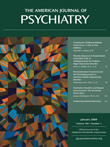To the Editor: We read with great interest the article by Anantha Shekhar, M.D., Ph.D. et al.
(1), published in the August 2008 issue of the
Journal, which stated that the muscarinic receptor agonist xanomeline improved schizophrenia symptoms overall, although one patient in the study showed worsening of psychotic symptoms.
We previously reported that physostigmine, a reversible centrally acting cholinesterase inhibitor, muted symptoms in schizophrenia patients
(2) . In our study, we examined eight floridly symptomatic schizophrenia patients who did not show marked affective symptoms, six acutely ill schizoaffective disorder patients, two depressed patients, and eight mania patients. A blunting of psychotic symptoms was observed among schizophrenia patients, and thus their delusions, hallucinations, and bizarre behavior qualitatively continued, although these symptoms were in muted form following administration of physostigmine. After receiving physostigmine, one patient, who claimed to possess telepathy with God, said “God is still talking to me, yet softly.” Additionally, physostigmine antagonized manic symptoms and induced depression in patients who had schizophrenia with an affective component. We subsequently demonstrated that physostigmine-induced behavioral, cardiovascular, and endocrine phenomena are antagonized by scopolamine, indicating central muscarinic phenomena
(3) .
We have also observed that the dramatic psychosis activating effects of intravenous methylphenidate, a dopaminergic psychostimulant, were antagonized by physostigmine when administered subsequent to methylphenidate and prevented when followed by methylphenidate
(4), which are findings consistent with preclinical studies
(5) . Treatment with physostigmine reversed mania but resulted in depressed patients becoming more depressed. Based on our results, we proposed a catecholaminergic-cholinergic balance hypothesis for schizophrenia
(4) that is consistent with the results of the study conducted by Dr. Shekhar et al.
Finally, we recommend caution, since Rowntree et al.
(6) administered diisopropylfluorophosphonate, a centrally active cholinesterase inhibitor, to patients with schizophrenia, mania, and depression and to healthy comparison subjects and observed a consistent dramatic and long-lasting activation of severe psychotic symptoms among six out of 17 schizophrenia patients, with one improving and 10 not changing. This activation of symptoms is consistent with findings from the early preclinical study of rats conducted by Fibiger et al.
(7), which suggested a compensatory catecholaminergic rebound following physostigmine-induced locomotor inhibition.

